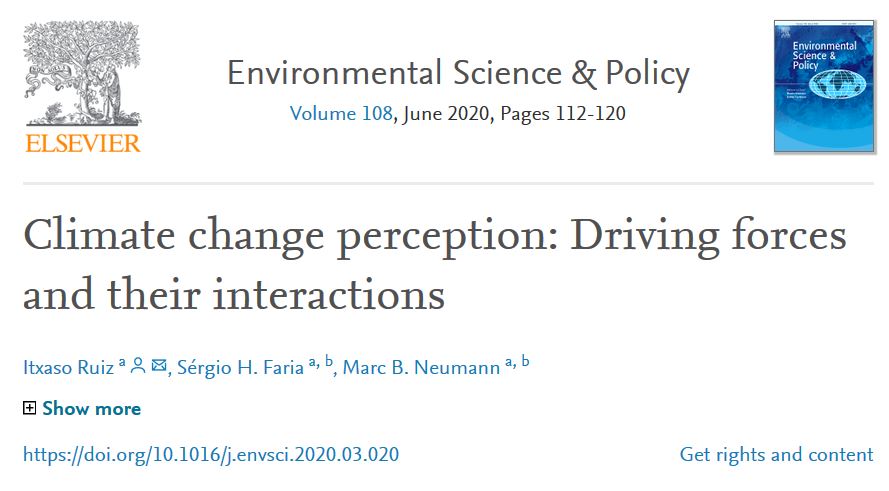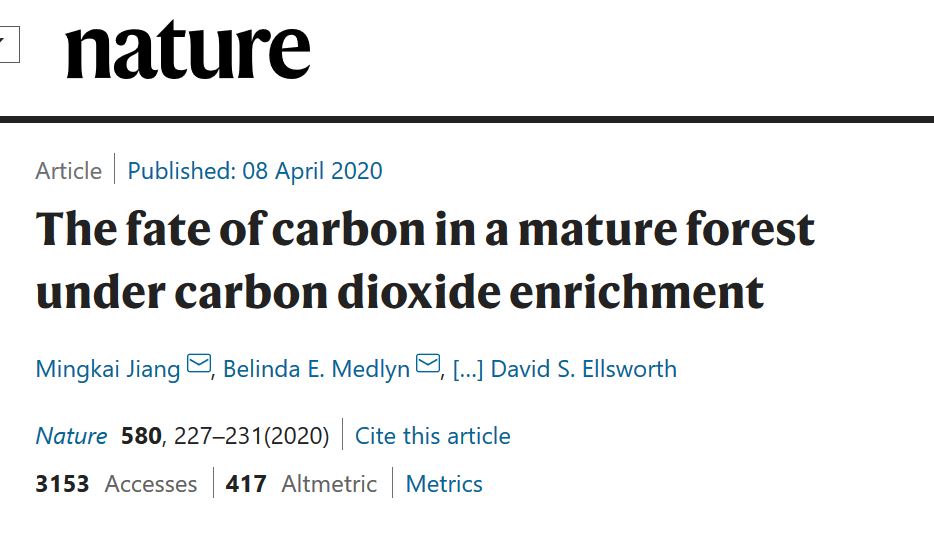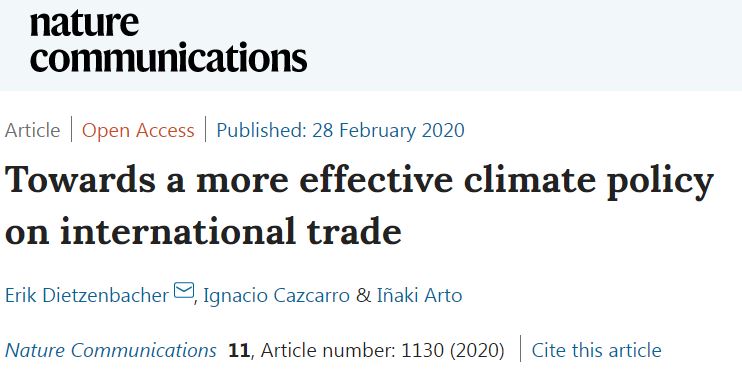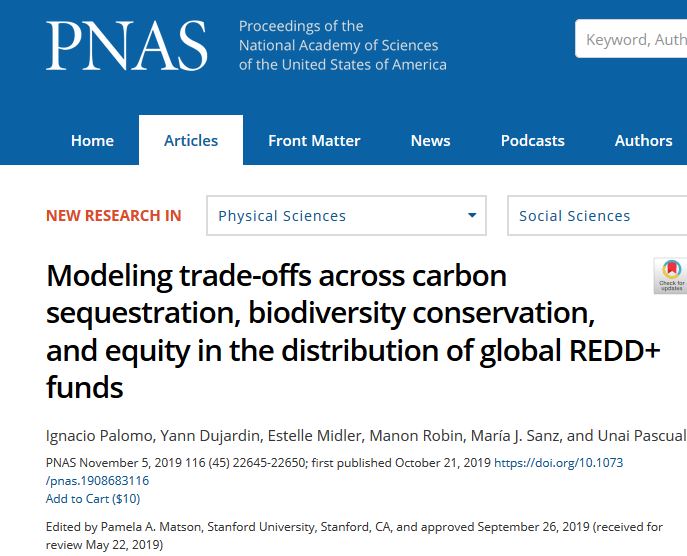Publications
April 28, 2020
Published by Mikel González-Eguino Maria Jose Sanz BC3Research at April 28, 2020
Categories
FUNCAS, with BC3 - Basque Centre for Climate Change collaboration, has released a new book about low carbon transition in Spain. "Transición hacia una economía baja en carbono" book has been edited by BC3 scientific director María José Sanz and BC3 senior researcher MIkel González-Eguino.FUNCAS is a private non-profit organization created and financed by CECA, as part of its social-charter investments, to carry out activities that will benefit Spanish society, promote a culture of saving and help raise awareness of the services savings banks offer to the community.
Do you like it?
April 24, 2020
Published by BC3Research Itxaso Ruiz at April 24, 2020
Categories
Public perception of climate change can either facilitate or hinder the implementation of climate policies. This perception is dependent on a number of influencing factors, called drivers, in ways that are still not clearly understood. Our study quantifies the relative strength of drivers of climate change perception, taking into account differences in the social, political, geographical, economic and educational identities of any considered community.
Do you like it?
April 16, 2020
Published by BC3Research David Moreno Asun Rodríguez at April 16, 2020
Categories
Multiple large-scale restoration strategies are emerging globally to counteract ecosystem degradation and biodiversity loss. However, restoration often remains insufficient to offset that loss. To address this challenge, we propose to focus restoration science on the long-term (centuries to millennia) re-assembly of degraded ecosystem complexity integrating interaction network and evolutionary potential approaches. This approach provides insights into eco-evolutionary feedbacks determining the structure, functioning and stability of recovering ecosystems. Eco-evolutionary feedbacks may help to understand changes in the adaptive potential after disturbance of metacommunity hub species with core structural and functional roles for their use in restoration.
Do you like it?
April 14, 2020
Published by Teresa Gimeno BC3Research at April 14, 2020
Categories
Atmospheric carbon dioxide enrichment (eCO2) can enhance plant carbon uptake and growth, thereby providing an important negative feedback to climate change by slowing the rate of increase of the atmospheric CO2 concentration. Although evidence gathered from young aggrading forests has generally indicated a strong CO2 fertilization effect on biomass growth, it is unclear whether mature forests respond to eCO2 in a similar way.
Do you like it?
March 26, 2020
Published by BC3Research Asun Rodríguez at March 26, 2020
Categories
Restoration ecology is a young scientific discipline whose limitations can compromise the recovery of ecosystem biodiversity and functions. Specifically for limitations on forest restoration, we first recommend considering measures prior to land use changes to deal with the common lack of efforts to anticipate and plan restoration. Second, we suggest using multiple references in restoration planning to avoid simplified reference characterization, and we advise assessing ecosystem recovery with indicators that better incorporate ecosystem complexity in recovery assessments.
Do you like it?
March 25, 2020
Published by BC3Research Iratxe Rubio at March 25, 2020
Categories
There is broad evidence of climate change causing shifts in fish distribution worldwide, but less is known about the response of fisheries to these changes. Responses to climate‐driven shifts in a fishery may be constrained by existing management or institutional arrangements and technological settings. In order to understand how fisheries are responding to ocean warming, we investigate purse seine fleets targeting tropical tunas in the east Atlantic Ocean using effort and sea surface temperature anomaly (SSTA) data from 1991 to 2017.
Do you like it?
March 20, 2020
Published by BC3Research Asun Rodríguez at March 20, 2020
Categories
A pesar del rápido crecimiento del uso de la restauración, esta no siempre genera una respuesta a corto plazo en los ecosistemas que garantice la recuperación de su estructura, funciones y servicios. Hasta ahora, la mayoría de los estudios que han evaluado la recuperación de ecosistemas utilizaban métricas que ignoran la complejidad necesaria para estructurar las comunidades de organismos que conforman los ecosistemas.
Do you like it?
March 2, 2020
Published by BC3Research Iñaki Arto at March 2, 2020
Categories
The attribution of the responsibility for the emissions for CO2 between producers and consumers is a controversial issue in NEW BC3 publication in Nature Communications journal “Towards a more effective climate policy on international trade” climate change policy and research. Two main accounting methods are used in the literature to determine countries’ contribution to global emissions. The production-based accounting (PBA) measures the amount of CO2 released to the atmosphere by the industries and households of a country. The consumption-based accounting (CBA) attributes emissions to the country’s consumption of final products. CBA redistributes the emissions from PBA and considers that emissions in another country are necessary for the home country’s consumption. These two accounting frameworks are used to assign responsibility for current CO2 emissions. Producer responsibility addresses the countries that directly generate the emissions. Consumer responsibility addresses the countries that ultimately drive the pressure.
Do you like it?
November 11, 2019
Published by BC3Research Ignacio Palomo Maria Jose Sanz Unai Pascual at November 11, 2019
Categories
The program on Reducing Emissions from Deforestation and Forest Degradation (REDD+) is one of the major attempts to tackle climate change mitigation in developing countries. REDD+ seeks to provide result-based incentives to promote emission reductions and increase carbon sinks in forest land while promoting other cobenefits, such as the conservation of biodiversity.
Do you like it?
October 22, 2019
Published by BC3Research Maria Jose Sanz at October 22, 2019
Categories
The Paris Agreement introduced an ambitious goal of limiting warming to 1.5 °C above pre-industrial levels. Here we combine a review of modelled pathways and literature on mitigation strategies, and develop a land-sector roadmap of priority measures and regions that can help to achieve the 1.5 °C temperature goal. Transforming the land sector and deploying measures in agriculture, forestry, wetlands and bioenergy could feasibly and sustainably contribute about 30%, or 15 billion tonnes of carbon dioxide equivalent (GtCO2e) per year, of the global mitigation needed in 2050 to deliver on the 1.5 °C target, but it will require substantially more effort than the 2 °C target
Do you like it?










